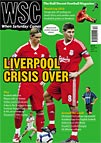 Tom Davies examines the financial crises at Chester City and Southend United
Tom Davies examines the financial crises at Chester City and Southend United
It’s already been a season of high-profile financial crises and ownership murkiness, as recent developments at Portsmouth, Notts County and Leeds demonstrate. It’s no brighter further down the scale either. Chester City continue to dangle tortuously over the precipice, a threat of expulsion from the Conference delayed until November 16.
The club’s problems seem insurmountable – money is owed to other clubs (notably gate money to Wrexham and loan player payment to Vauxhall Motors) and the tax authorities. They began the season with minus 25 points following their relegation after a company voluntary arrangement (CVA) was opposed by Her Majesty’s Revenue and Customs in the summer. This itself was a controversially lenient punishment given that failure to have a CVA in place would normally have meant immediate expulsion, but it has nonetheless rendered Chester’s campaign on the pitch pretty much dead in the water. The departure of the manager Mick Wadsworth and reports of dressing-room discontent have scarcely been surprising in the circumstances.
At the root of it all is the club’s unshiftable owner Stephen Vaughan, unwilling to relinquish control and seemingly unable to meet all the debts, which appear to be huge, though their precise details remain opaque. Figures released by managing director Bob Gray earlier this season claimed that the club were projecting a loss of £600,000 for this season alone, as well as expenditure on player wages that was 50 per cent over their turnover.
The accuracy of these figures and where this money might be coming from has been questioned, given the club’s financial predicament and the withholding of their £225,000 parachute payment, not to mention dwindling gates, but it all points to an unmanageable mess. Vaughan has put the club up for sale before, but some of the possible suitors have hardly instilled confidence, prime among them being John Batchelor (see WSC 264), infamous for his role in past crises at York City and for floating gimmicky “rebranding” ideas. But Vaughan is clinging on. Meanwhile hope of an FA Cup windfall evaporated when Chester were knocked out of the fourth qualifying round by Barrow, where coincidentally Vaughan was chairman in the 1990s and in whose charge they nearly went under.
It is increasingly likely that Chester fans will have no option but to rip it up and start again. Disunity among supporters has been healed to an extent with the recent launch of City Fans United, an amalgamation of the supporters trust and the independent supporters association who are looking to build up funds and explore alternative ways forward. “No one’s going to pay the current club any money and if the owner is not prepared to sell I cannot see any other option,” says CFU spokesman Tom Jones on the possibility of beginning anew. “At our launch meeting no one spoke against starting from scratch again, which would have been unimaginable two years ago. Because I cannot understand what positive moves there are to take Chester City Football Club into its 125th year.”
Southend United were teetering on the brink of administration at the time of going to press with debts to HMRC of around £700,000, resulting in the imposition of a transfer embargo under new rules on unpaid tax debts. An unnamed consortium of ten Southend-supporting businessmen revealed an intention to buy the club on November 2, two days before the deadline, but a ten-point deduction still looks highly possible.
The League One club’s existing chairman, Ron Martin, has cited the credit crunch and recession as the root cause of the crisis (and a cynic might quip that the global financial crisis has replaced the collapse of ITV Digital as the club chairman’s one-size-fits-all explanation for meltdown). A shortage of outside financial support has stymied Southend’s expansive plans for a new stadium at Fossetts Farm, upon which Martin has staked much, though the costs associated with Southend’s season in the Championship three years ago are also rebounding on them.
Not only are Southend struggling for funds for the new stadium, the other end of the project has also run into trouble. The sale of Roots Hall is partly dependent on Sainsbury’s, the prospective developer of the site, agreeing a deal to purchase land from the neighbouring Prospects College, which owns part of the car park at the ground and is yet to agree a sale. That Southend only rent Roots Hall also limits the club’s asset base.
The new ground plans will probably have to go on the backburner for now anyway, as the club focus on the more immediate task of tackling their sizeable debts, and the spectre of administration. Martin continues to make optimistic noises about Southend’s willingness and ability to meet their financial obligations, though fans have become less confident. “He said there wasn’t a problem and was managing our funds and he’s let us down on that,” said Rob Craven of the Shrimpers Trust. Another asterisk in the League One table points column looms.
From WSC 274 December 2009